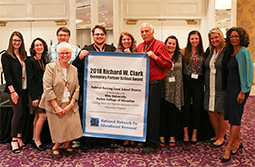The Patton College of Education’s CARE Program wins national award

Photographer: Ana JuneThe Patton College group celebrates winning the Richard W. Clark Award in Charlotte, North Carolina.
The Patton College of Education’s CARE program received the National Network for Educational Renewal (NNER) Richard W. Clark Award for Exemplary Partner School Work for its outstanding partnership with Federal Hocking Local Schools. The College received the award at the NNER Annual Conference in Charlotte on Oct. 10.
“It is an honor to be recognized for our work with Federal Hocking Local Schools,” said Marcy Keifer Kennedy, director of the Ohio University Center for Clinical Practice in Education. “We are very proud of the work that we do together.”
The award recognizes a partner-school collaboration that develops, advances, and sustains the complex work of colleges and school districts working together as equal partners to further student achievement. It recognizes the contributions of Richard W. Clark, whose leadership in partner-school research and practice continues to influence NNER partner schools.
NNER strives to improve schools, universities, and communities and believes that all students – regardless of race, poverty, geography, or any other circumstance – deserve equal access to high-quality learning and enriching life experiences. It provides ongoing professional development to member institutions, sharing best practices to inform local, state, and national policies.
CARE – Creating Active and Reflective Educators – is one of the College’s longest-running partnerships, with 30 years of collaboration with local schools. The program, which focuses on progressive education, significantly informed the Clinical Model of Education Preparation.
“We were looking for a way to develop a teacher education program that focused on the progressive principles as put forth by John Dewey,” said Federal Hocking Local Schools Superintendent George Wood, a former OHIO faculty member who helped create CARE. “It wasn’t just to create a partnership or a cohort; it was actually to create a program with a philosophy. We wanted to work with students for three years – perhaps even four – and develop in them a sense of what it means to be a progressive educator.”
That includes forming long-term relationships with local schools – one, in particular. CARE students do not teach at one school one semester and another the next. They remain at one site and work and grow within those halls and within that community.
“(It’s important for students to) really to dig into one place, learn the culture, learn how the culture functions, learn how to operate in that culture, and contribute something to the culture,” said Wood. “The most important thing you can do in schools is build human connections. They are part of the staff. In their senior year, they really are a co-staff member. It really ramps up what we can do with students because we have all these extra sets of hands. They bring so much value to the school.”
As part of the program, CARE candidates learn how theory and practice intertwine. Beginning in the fall of their sophomore year, they travel as a cohort through the CARE course of study, working immediately and continuously in partnership schools.
“It gets our candidates into classrooms early and often,” said PDS Partnerships Faculty Co-Coordinator Bill Elasky. “I think the fact that they’re involved in the Federal Hocking School District the whole time, they feel like they’re a part of the school and they’re treated that way. The students see them as an important part of what’s going on here. The teachers see them as almost colleagues. I think there’s a back and forth between our candidates and the teachers here at Federal Hocking Schools where they feed on each other. I think there’s a relationship, which allows good things to happen for kids.”
CARE candidates quickly become passionate about their work and committed to the democratic principles of student-centered pedagogy. Mentor teachers benefit as well.
“It’s another teacher in the room with me,” said Federal Hocking teacher Ann Cell. “I learn every day from having CARE students in the classroom.”
CARE candidate Sara Halfrich, meanwhile, can say the same. She teaches students, but the students also teach her.
“I’m learning just as much as they are,” she said. “They’re teaching me just as much as I’m teaching them.”
Indeed, when colleges and universities work with school districts to improve P-12 learning, everyone benefits.
“I am truly proud of all of our teacher candidates and professional interns, the knowledgeable and caring faculty we have in our College, and the devoted teachers, principals, and superintendents in the field,” said Patton College Dean Renée A. Middleton. “In our College, we say we are CALLED to Lead; so is everyone who makes the world a better place each and every day by sharing the gift of knowledge.”
The CARE program is planning to celebrate its 30th anniversary in June 2019. If you were – or are – involved with CARE as a candidate, mentor teacher, or faculty member, we encourage you to pre-register for the event. The pre-registration form is available here. You can also follow the event via Facebook to stay up-to-date with event details as they are released.
